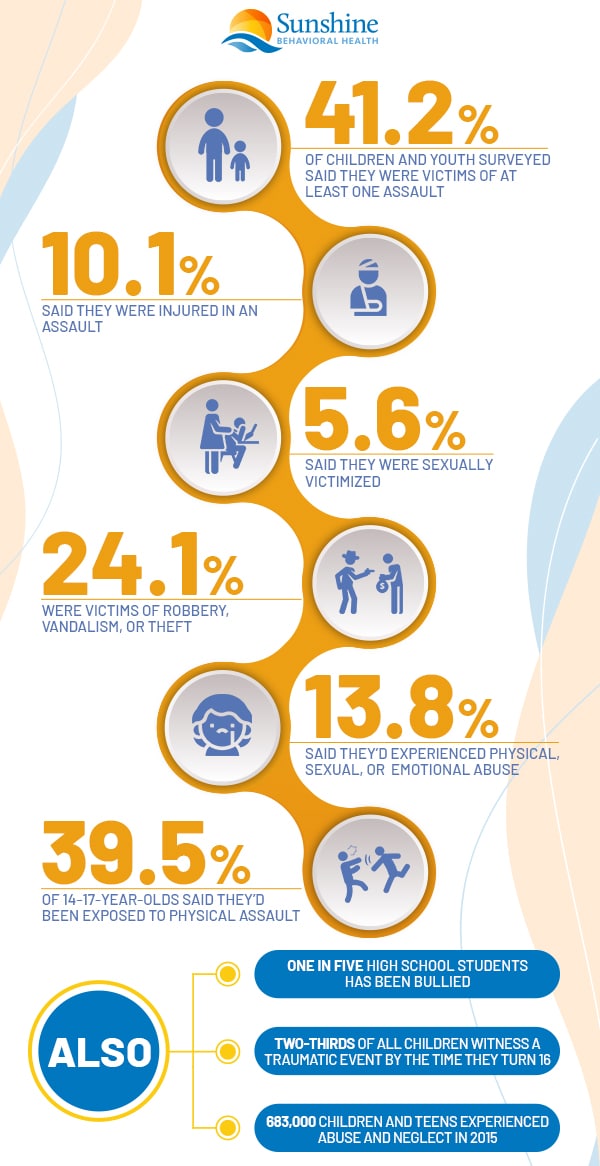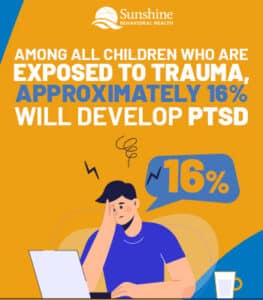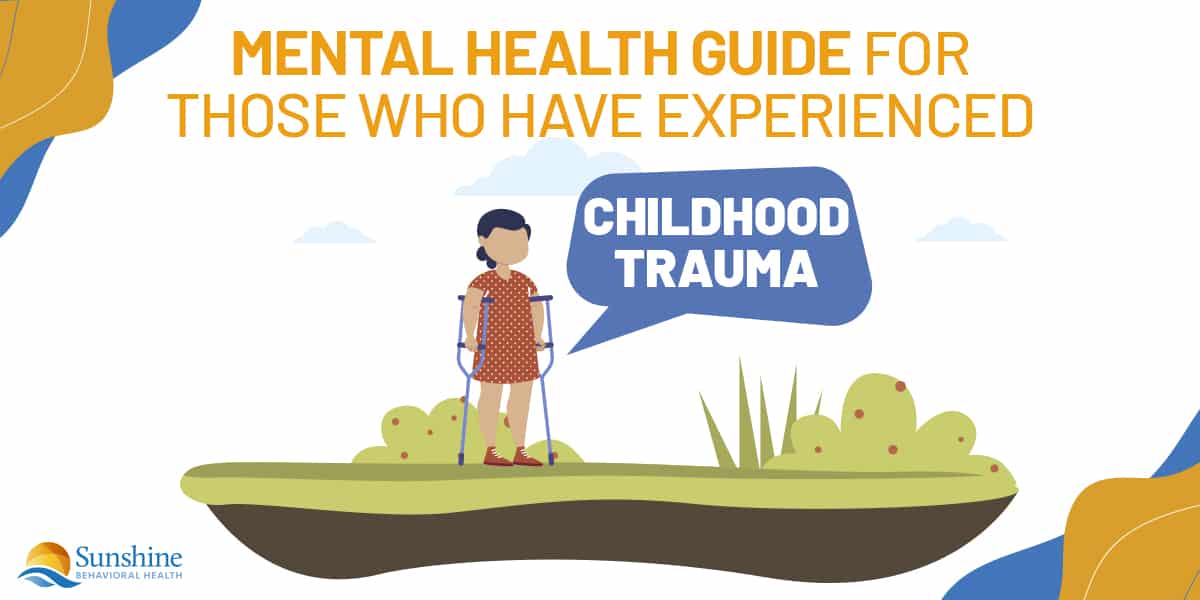Mental health issues can impact just about anyone at any time. This includes children.
There are many mental health issues that can often be overlooked during childhood. Some people assume that children with mental illnesses are having temper tantrums or teenage behavioral issues, while other people believe children will grow out of their emotional distress.
These are not true, as many children suffer traumatic experiences during childhood that continue to impact them during adulthood.
In order to better treat mental health issues, it is crucial to recognize that they can impact people of all ages, including children. Children may experience depression, anxiety, and bipolar disorder, and sometimes, traumatic experiences contribute to such disorders. By understanding the impacts of traumatic experiences on children, it is possible to provide everyone with access to better mental health resources.
How can experiences relate to childhood trauma? What are the impacts of childhood trauma on children? How can we provide better access to mental health resources for children and adults? There are several important questions to explore.
Childhood Trauma Is More Common Than Many People Realize
Traumatic experiences can impact anyone at any time, including children. Furthermore, childhood trauma may be more common than many people realize. A few statistics related to childhood trauma include:
- One in five high school students experiences bullying at school.
- More than two-thirds of all children witness a traumatic event by the time they turn 16.
- Approximately 40 percent of all children in the United States say they have experienced some form of physical assault during the preceding 12 months.
- Approximately one out of every 10 children has experienced an injury related to a physical assault.
- Approximately two percent of all children experience sexual assault, sexual abuse, or some form of unwanted sexual contact during the preceding year.
- Close to 40 percent of all children between the ages of 12 and 17 report witnessing a violent act during the past 12 months.
- Approximately 60 percent of all children have been exposed to abuse, crime, or violence, either directly or indirectly.
- In one study of more than 530 elementary and middle school students, close to 1/3 of these individuals had witnessed a stabbing and more than a quarter had witnessed someone being shot.
Such statistics indicate the importance of addressing trauma with children. Knowledge can help caregivers, adults, and authorities keep these children safe from harm and understand the resources available.
Even though it might be impossible to shield children from every negative aspect of society, it is possible to provide children with access to the mental health resources they need to process such events, put them in perspective, and give them access to treatment. Understanding the impact of traumatic events may help adults take better care of children.
What Are the Impacts of Traumatic Events on Children?
Traumatic events can produce several negative impacts for children. While traumatic experiences can lead to serious mental health issues in adults, experiencing traumatic events during people’s formative years can lead to a wide variety of issues.
Children who are exposed to traumatic events are more likely to:
- Attempt suicide.
- Struggle with substances such as alcohol, drugs, and tobacco.
- Develop heart and liver disease.
- Experience depression, uncontrollable anger, temper tantrums, and rapid emotional changes.
- Have financial problems and problems finding employment.
- Find it difficult to maintain meaningful relationships with family members and friends and experience relationship problems.
- Require long-term mental health care.
For these reasons, it’s helpful to be able to spot the signs of serious mental health issues in children as quickly as possible. Doing so can help give children access to the resources they require. What are a few signs that children may be struggling with mental health issues?
What Are Some Signs of Mental Health Issues in Children?
Compared to adults, mental health issues can present differently in children. It can be useful if parents and caregivers can identify signs of a serious mental health issue, which could include:
- Children who are persistently sad, particularly for two or more weeks.
- Kids who withdraw from certain social interactions with their family members, friends, and colleagues due to a traumatic experience.
- Children who talk about hurting themselves.
- Kids who hurt themselves.
- Children who talk persistently about death or suicide, a sign that should be addressed as quickly as possible.
- Children who experience temper tantrums or rapid mood swings that continue for several days.
- Kids who engage in risky behavior, including engaging in dangerous sexual encounters, drinking alcohol, using drugs, smoking, and spending money without caution.
- Children who experience rapid and unintentional changes in appetite and weight.
- Kids who have difficulty falling asleep or staying asleep.
- Children who often complain of nonspecific symptoms such as muscle aches, stomach pains, and headaches that do not improve with time.
- Kids who are having a difficult time concentrating on their schoolwork or homework.
- Children who experience sudden drops in their academic performances.
- Kids who make excuses to skip extracurricular events, school, or activities.
Any child with these symptoms should visit a mental health professional as quickly as possible. Without prompt assistance, mental health issues could develop or worsen.

Mental Health Disorders in Children Following a Traumatic Experience
Following a traumatic experience, children might develop mental health issues. A few examples of such conditions include:
- Anxiety: Between six and seven percent of children are diagnosed with anxiety at some point during childhoods. In children, anxiety disorders may appear as persistent worries or fears that may impact their ability to participate in school, sports, and other activities. Kids may be diagnosed with generalized anxiety disorder, social anxiety, or panic disorder.
- Depression: Approximately five percent of children are diagnosed with depression at some point during their childhoods. Depression refers to persistent feelings of sadness. Children may experience a loss of interest in activities that used to bring them pleasure and joy. This could impact their ability to function in school and interact with their peers.
- PTSD: PTSD stands for post-traumatic stress disorder and often consists of anxiety, distressing memories, and nightmares. This disorder can occur following child abuse, a violent accident, or a serious injury. Among all children who are exposed to trauma, approximately 16 percent develop PTSD.
- Bipolar disorder: Some children develop bipolar disorder, a condition that includes episodes of depression and episodes of mania. Episodes of depression might include sleep issues, appetite changes, weight loss, and a decreased interest in activities. Mania may manifest as euphoria, increased energy, reduced sleep requirements, and increased risk-taking behavior.
Because mental health issues can have a significant impact on the development of a child, it is important for parents to seek mental health treatment as quickly as possible, particularly if their child has been exposed to a traumatic event.
Barriers can make it challenging for parents to access mental health treatment for their children. Addressing the barriers can help ensure that children have access to the care they need. What are a few of the barriers that need to be addressed?
Why Is it More Difficult for Children to Access Mental Health Professionals?
Several common barriers may prevent children from accessing the mental health resources they require. For example, some people may confuse mental health issues with normal childhood development. The personalities of children sometimes change as they get older. It might be easy to confuse mental health issues with normal childhood development, temper tantrums, and emotional concerns.
Symptoms of mental health disorders in children can also vary depending on their age. Younger children may have a difficult time expressing their feelings. They may also have a difficult time explaining why they are behaving in a certain way. It can be difficult for parents, friends, teachers, and other caregivers to tell if these children are experiencing a mental health issue.
There are a few other common barriers as well:
- Children may be afraid that others will bully or mistreat them if they learn that they have a mental illness or are attending therapy.
- Parents may find it difficult to convince their children to take prescription medications that they’re using for mental health issues.
- Parents may be concerned about the cost of seeking mental health care.
- Children who cannot travel to appointments alone may present logistical challenges in finding mental health treatment.
Parents and children should understand that there are resources available. In addition to mental health professionals, there are also nonprofit organizations that might make it easier for parents to find mental health treatment for their children.
When children have access to appropriate mental health treatment, they may have an easier time processing traumatic experiences from their past. This could improve their quality of life in the future.
How Are Childhood Mental Health Issues Treated?
Many mental health issues during childhood are diagnosed and treated based on clinical signs and symptoms. Mental health professionals make treatment decisions based on how the specific conditions may impact children’s daily lives.
Steps involved in diagnosing and treating a childhood mental illness could include:
- Taking a complete medical history.
- Conducting a thorough medical exam.
- Analyzing physical or emotional trauma that may be present.
- Studying a family’s history of physical or mental health issues.

- Reviewing the timeline of the child’s developmental milestones.
- Looking at the child’s academic history.
- Talking with the parents or guardians and the child.
- Providing standardized assessments and questionnaires for parents/caregivers and children.
Mental health professionals look at such factors when making treatment decisions. There are several treatment options available:
- Therapy is the cornerstone for treating many mental health issues, including those in children. Examples of common types of therapy include dialectical behavioral therapy (DBT) and cognitive behavioral therapy (CBT).
- Prescription medications may be recommended for some mental health conditions. Such medications could include antidepressant medications, antianxiety medications, mood stabilizers, and stimulants.
Children should try to see mental health professionals soon after traumatic events and try to visit them multiple times, if possible. Mental health professionals can determine how children are recovering and can make changes to treatment plans, if needed.
Mental Health Resources for Childhood Trauma
- National Child Traumatic Stress Network – A database of resources that can help families find mental health treatment for children who have experienced traumatic events.
- Child Mind Institute – More resources that can help parents learn how to discuss trauma with their children and help them find mental health professionals who could provide expert care.
- Child Welfare Information Gateway – A resource offered by the U.S. Department of Health and Human Services as well as the Administration for Children and Families that helps parents find local mental health professionals and provides educational resources.
- American Psychological Association, Children and Trauma Resources – A network of resources available for families with children who have been exposed to trauma.
- Kids Mental Health Info.com Child Trauma Information
- Trauma Related Resources at the Center for Child and Family
- Trauma Resource List – Trauma-Informed Care
- Home | NAMI: National Alliance on Mental Illness
- SAMHSA – Substance Use Disorder and Mental Health Services Administration
Sources
Medical disclaimer:
Sunshine Behavioral Health strives to help people who are facing substance abuse, addiction, mental health disorders, or a combination of these conditions. It does this by providing compassionate care and evidence-based content that addresses health, treatment, and recovery.
Licensed medical professionals review material we publish on our site. The material is not a substitute for qualified medical diagnoses, treatment, or advice. It should not be used to replace the suggestions of your personal physician or other health care professionals.







